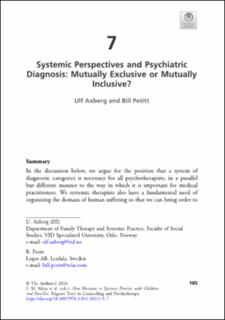Systemic perspectives and psychiatric diagnosis: Mutually exclusive or mutually inclusive? Chapter 7
Chapter
Published version
Permanent lenke
https://hdl.handle.net/11250/3101613Utgivelsesdato
2023Metadata
Vis full innførselSamlinger
Originalversjon
Axberg, U., Petitt, B. (2024). Systemic Perspectives and Psychiatric Diagnosis: Mutually Exclusive or Mutually Inclusive?. In: Myra, S.M., Grøver, T., Axberg, U. (eds) New Horizons in Systemic Practice with Children and Families. Palgrave Texts in Counselling and Psychotherapy. Palgrave Macmillan, Cham. https://doi.org/10.1007/978-3-031-38111-9_7Sammendrag
In common with most others who work in the field of mental health, the authors have been obliged to develop a professional relationship with the two dominant diagnostic guides, The International Classification of Disease 10 (ICD-10) and the Diagnostic and Statistical Manual of Mental Disorders 5 (DSM-5). While they concur with the widely held view that there are many problematic issues connected to both diagnostic systems, many of the conflicts generated within the mental health field that we are aware of seem to emerge from the different meanings that are attributed to them and/or the ways in which they are applied. We argue for the position that a system of diagnostic categories is necessary for all psychotherapists, in a parallel but different manner to the way in which it is important for medical practitioners. We systemic therapists also have a fundamental need of organizing the domain of human suffering so that we can bring order to our clinical practice, our research and our professional communication. The most important question is “how?”.
Beskrivelse
This chapter is licensed under the terms of the Creative Commons Attribution 4.0 International License (http://creativecommons.org/licenses/by/4.0/), which permits use, sharing, adaptation, distribution and reproduction in any medium or format, as long as you give appropriate credit to the original author(s) and the source, provide a link to the Creative Commons license and indicate if changes were made. The images or other third party material in this chapter are included in the chapter's Creative Commons license, unless indicated otherwise in a credit line to the material. If material is not included in the chapter's Creative Commons license and your intended use is not permitted by statutory regulation or exceeds the permitted use, you will need to obtain permission directly from the copyright holder.

